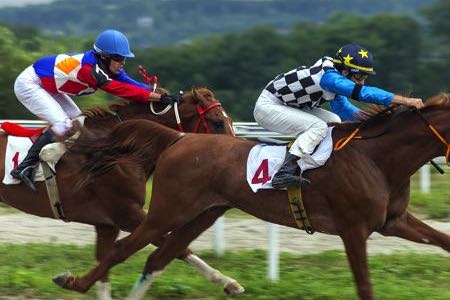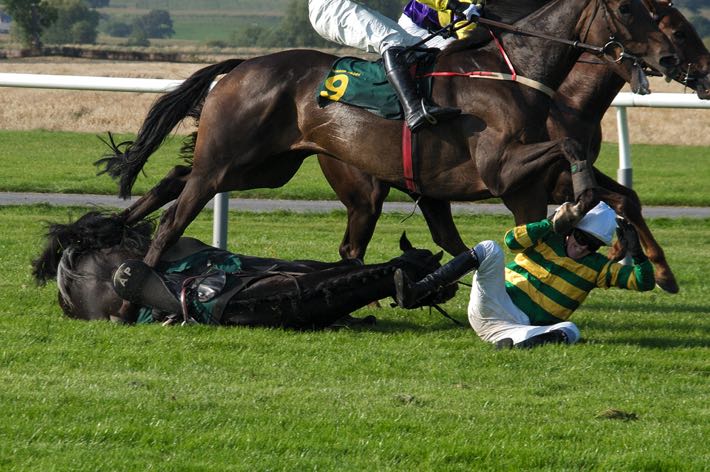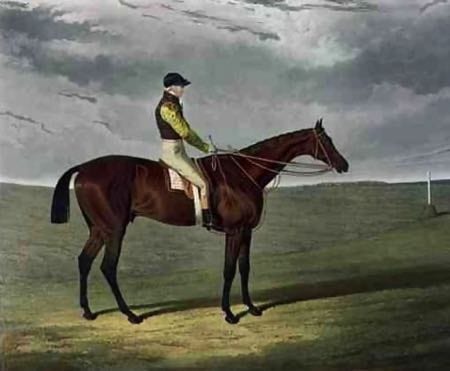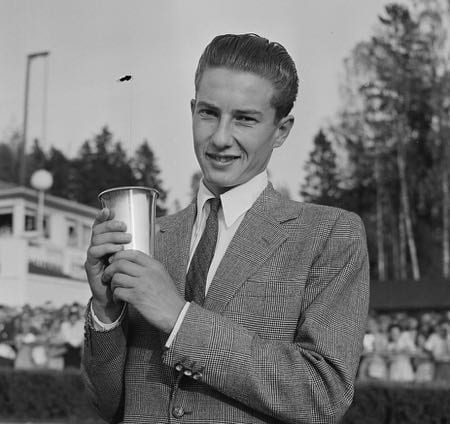
Horse racing is a sport that always feels as though it’s something of a young person’s game. After all, those involved are having to put themselves through incredible physical feats in order to make it through races each day. Whilst jockeys are traditionally small, being of short stature doesn’t automatically mean that you’re thin, light and always fit, meaning that jockeys have to follow an intense fitness regime.
Of course, anyone aged 40 that is still fit and in good health would bemoan the idea of writing those that age off, but the reality is that the older you get the more difficult it is to keep both mentally and physically sharp. With that in mind, it’s worth having a look at some of the jockeys that managed to continue their racing career well after the age that you would call their ‘prime’, which is what we’ll look at here.
The Average Age of Jockeys

There’s little point in discussing older jockeys without having a sense of what the average age of riders actually is. As you might imagine, flat racing jockeys tend to last for long than those that specialised in jump racing, with the latter putting their bodies through far more physical exertion than the former. It’s a career that starts relatively early, with most jockeys getting into the sport when aged between 16 and 22.
It’s likely that many jockeys will have known that that’s what they wanted to do for much longer, starting riding when they were a child. Often working in the horse racing industry is something that at least one member of the family already does before people choose to become jockeys themselves. There is no upper age limit for jockeys, though most jockeys tend to leave the sport when they’re 35 or 45, depending on discipline.
Flat vs Jump Jockeys
Jump jockeys tend to leave the sport when they’re 35, compared to flat racing jockeys who retire at the age of 45 on average. There are numerous reasons why a jockey might choose to no longer take part in racing, with their physical health high on the list. There’s also the fact that it becomes harder to maintain the correct levels of physical fitness as jockeys get older, plus it’s not exactly as if it’s a well-paid profession.
Given the ever-changing nature of the composition of jockeys, it’s difficult to work out an exact average age. Add to this the fact that jockeys will retire at different ages depending on which county they’re based in and you can see how it’s tricky to work out any sort of average. At the time of writing, the British Horseracing Authority says that there are about 450 licensed jockeys and a further 300 amateurs.
If we say that there are therefore 750 jockeys aged between 16 and 40, in order to take into account the difference in retirement age between jump and flat racing, then we can assume that the average age for a jockey would be 28 years of age. That doesn’t take into account the older jockeys that continued racing well past 40, but without having an exact list of them it would be impossible to do the sums on that regardless.
Looking at Older Jockeys

Perhaps somewhat unsurprisingly, those jockeys that really are older than the average tend to make the news. As an example, we can look at John Forth. The British hockey and later racehorse trainer is the oldest man known to have ridden the winner of the Derby, which he achieved in 1829 at the age of 60. What made that success even more remarkable was that he’d also trained the horse that year. He went on to train the winning horse in 1849 and 1845, too.
Sue Martin – 62
Forth isn’t the only jockey to have grabbed the attention thanks to his success as at an older age. Sue Martin was the cause of some media attention in 2017 when she won a race at Tampa Bay Downs in Florida on the back of 25/1 shot Blue Haze of Fire. That alone might have been worthy of headlines, but the fact that she did it aged 62 and as a four-time great grandmother certainly added to the tale.
Martin’s tale is both life-affirming and a cautionary one, given that the following is the list of injuries that she suffered during her career:
- Numerous concussions
- Broken collarbone
- Broke both cheekbones
- Broken left arm fixed with plate and screws
- Dislocated shoulder
- Broke four vertebrae in back
- Punctured lung
- Titanium rod in shin
- Screws in knee
- Broken left foot
That gives you a sense of the sort of things that a jockey has to put themselves through in order to keep racing into their later years. Martin rode horses at most of the courses across the United States of America, meaning that she had to travel long distances as well as sustain countless injuries to manage her career as a jockey. She earned in the region of $150,000 as a professional jockey.
Trond Jørgensen – 61
Trond Jørgensen retired in August of 2018, just days before we would have turned 62 years of age. The Scandinavian jockeys was one of the best in the business in his home country, riding a horse for the first time as a 17-year-old in 1973. He actually fell off the first time, but he didn’t let that deter him and went on to have a career that spanned several decades and picked up over 500 wins during that time.
In the end, it was the ‘battle with the weight’ that caused him to call time on his life in the saddle, with the jockey declaring that if not for that he could have raced on into his seventies. Part of the reason he was able to keep riding was the fact that not many of his falls caused serious damage, with most of them only affecting his soft tissue. That being said, he declared that ‘wear and tear is something that you can’t avoid’.
Gary Bain – 66
Maybe there’s something in the water in the United States of America that causes jockeys to keep riding well into their latter years. Perhaps it’s just the fact that a lack of universal healthcare means that they need to keep taking rides if they hope to pay for their medical bills. Whatever the reason, Gary Bain was not only able to keep riding but also to keep winning, even once he was well into his sixties.
Bain was still riding when he was not only a father of two but also a grandfather of six. Having raced for more than five decades in the United States, there wasn’t much that Bain didn’t encounter during his career. Towards the end of his career, he was going up against jockeys in their 20s, with one of the valets referring to him as the ‘grandfather of racing’. Born in the Bahamas into a racing family, he’d always ridden horses from an early age.
Bain racked up more than 1,000 wins in his career, which took in in excess of 14,000 starts. He raced in both the biggest races in the country as well as a host of smaller ones, with the former including the WHAS Stakes in 1996, which took place at Churchill Downs on the same day as the Kentucky Derby. Having only fallen twice in his career, it is perhaps no surprise that he was able to keep on racing into his dotage.
Danny Miller – 70
It’s not just in the United States of America where the jockeys keep going long after most would have hung up the saddle. Danny Miller was the oldest jockey in Australia when he was urged to retire by doctors despite riding Fashion Forward to second at the age of 70. In the end, the Australian Racing and Wagering WA told him that he’d need a doctor’s clearance before he’d be allowed to ride again, such was his refusal to give up.
Even when he was told not to race as a result of ‘serious medical advice’, the man that had earned the nickname ‘Dashing’ got in touch with the country’s Shadow Minister for Racing & Gaming, John McGrath. He said that his licence allowed him to carry on racing unit the end of the season and so that was what he planned to do, saying, “I’m fit and well and I had no intention of retiring.”
After a 56 year career, it’s little wonder that he was loath to walk away from the sport he loved on a bad note. His career included riding in the Melbourne Cup in 1967, five years after he won his first race at Ascot. He also won the Group 1 Railway Stakes in 2000 on a horse named Northerly. Whilst the Australian racing board might have been trying to look after him by forcing him to retire, it’s hardly surprising that the decision to do so left him ‘heartbroken’.
David Robinson – 66
When a career spans several decades, it’s not unusual to imagine that it might just involve countless wins. That’s not quite the case with David Robinson, who rode just his 43rd career winner at the age of 66 in 2008. That might well explain why he only rode in point-to-point races and continued his work as a beef farmer, in spite of his love of horse racing and the fact that he’d been doing it for so long.
He was Britain’s oldest licensed jockey when he extended his winning record to 43 at Godstone in 2008, with both him and his horse Bee An Bee, having missed the previous season. Even so, he wasn’t rusty when he returned to the saddle and led throughout the race, receiving a rousing reception from the watching crowd as he entered the final straight. When the race was run, he declared himself to be ‘absolutely knackered’.
Whilst the point-to-point was where he excelled, his career as a horse owner and trainer did take him to some well-known jump racing meetings. In 2000, for example, he rode Struggles Glory in the Foxhunters’ Chase during the Grand National Festival, falling at the first fence. He then entered Struggles Glory into the Grand National itself in 2002, though chose to give up his space in the saddle for that ride.
Lester Piggott – 59

It’s not just little-known jockeys that keep racing well into their older years, as proven by the fact that Lester Piggott didn’t retire from the sport until he was 59. The man considered by many to be one of the greatest flat racing jockeys of all time, he notched up his first ever win when he was just twelve-years-old. That came in The Chase at Haydock Park in 1948, kick-starting a career that would see him named Champion Jockey 11 times.
His career saw him win 5,300 races around the world, with 4,493 of those coming in Great Britain. He finished his career with 30 English classics to his name, of which 9 came in the Epsom Derby. He also demonstrated his flexibility as a jockey by winning over hurdles on 20 occasions. Known to many as ‘The Long Fellow’, he had a competitive personality in the saddle and kept himself 30 pounds under his natural weight.
His nickname came about on account of the fact that he was surprisingly tall for a flat racing jockey, coming in at five foot eight inches. His style of racing was unique at the time, later copied by those that came after him. When he retired at the end of the 1985 flat racing season as a 59-year-old, doing what many former jockeys decide to do and becoming a trainer. He enjoyed an Indian summer of a racing career, coming out of retirement in 1990 and retiring again five years later.